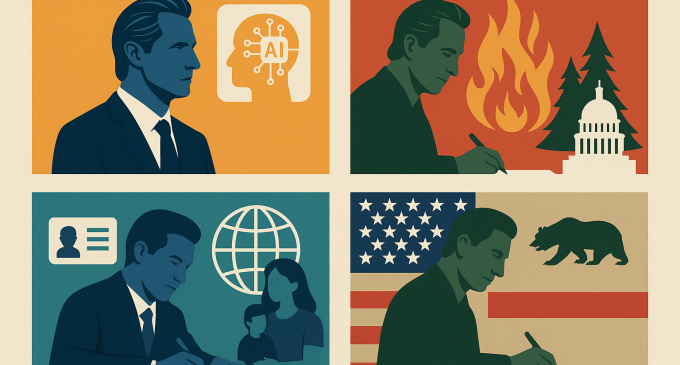
Introduction
Governor Gavin Newsom has signed hundreds of bills into law in 2025, reflecting one of California’s most ambitious legislative sessions in recent years. These new laws touch nearly every part of life — from artificial intelligence and wildfire recovery to healthcare, education, consumer rights and housing. The package underscores California’s continuing role as a policy leader, often setting national standards on key issues. Below is a detailed look at the most significant measures and what they mean for residents, businesses and communities.
Strengthening Law Enforcement Transparency And Immigrant Protections
A major focus of the 2025 legislation is improving public accountability in law enforcement. One new law prohibits officers from covering their faces while on duty and requires them to display their name and badge number clearly. This aims to increase transparency, especially during public demonstrations or community operations.
Several other measures protect immigrant families and students. Schools are now barred from allowing federal immigration agents to conduct enforcement actions on campuses without a valid warrant or court order. In addition, schools must notify staff and parents if immigration officials appear on school grounds. These laws are designed to ensure schools remain safe spaces for all students, regardless of immigration status, and that communities maintain trust in public institutions.
Wildfire Recovery And Support For Victims
California’s growing wildfire threat continues to drive major legislative change. The 2025 package expands assistance for homeowners, tenants and small businesses recovering from fires. Residents impacted by declared wildfires can now receive up to twelve months of mortgage forbearance, and displaced individuals are permitted to stay in temporary housing such as hotels or rentals for extended periods without being classified as tenants.
Fire victims also gain the right to rebuild their homes without property-tax increases for an additional three years. Insurers must now offer up to sixty percent of personal-property coverage without requiring an itemized list of lost possessions, easing paperwork burdens during recovery.
The state also launched the California Safe Homes Grant Program to help low-income homeowners build fire-resistant roofs and clear vegetation around properties. Together, these changes emphasize not only post-disaster relief but also prevention and resilience planning for future fires.
Gun Safety And Regulation
California continued its incremental approach to firearm regulation by banning the sale of new Glock handguns. Existing models already owned or in circulation remain legal, but new sales are prohibited due to safety concerns over illegal modifications. This move reflects California’s continued effort to reduce gun violence through targeted restrictions on specific weapons linked to criminal misuse.
Health Care Access And Insulin Price Cap
The cost of healthcare remains a major issue, and the state took action by capping out-of-pocket insulin costs at thirty-five dollars for a month’s supply. This measure will make life-saving medication more affordable for hundreds of thousands of Californians living with diabetes.
The law also supports the state’s CalRx initiative, which will begin producing and selling affordable insulin pens starting in 2026. This combination of a price cap and state production marks a bold step toward lowering drug prices through both market competition and public intervention.
Animal Welfare And Pet Protection
Animal welfare advocates saw a series of major victories this year. New laws prohibit pet brokers from importing dogs from out-of-state breeders without proper health documentation, while also banning unnecessary surgical procedures such as cat declawing.
The state’s goal is to eliminate unethical breeding practices and improve transparency for consumers purchasing pets. These measures ensure that animals entering California are healthy, traceable and humanely treated, and that buyers are protected from unscrupulous pet dealers.
School Safety, Online Protection And Digital Responsibility
School and child safety emerged as another key area. One new law makes it a crime to threaten violence against schools, daycare centers or workplaces, even without naming specific individuals. Another extends regulations that prevent excessively loud advertisements to include streaming services, closing a loophole in digital media law.
Digital safety for children received special attention. Artificial-intelligence-based chatbots marketed as “AI companions” must now display disclaimers clarifying that they are not healthcare professionals. Developers must also include safeguards for detecting self-harm or suicidal ideation in users. Social-media platforms must add warning labels to alert young users about the mental health risks of excessive use, while “deepfake” pornography creators and distributors can be held civilly liable. These steps signal a growing recognition of the need to regulate AI and online behavior to protect minors and promote responsible technology use.
Data Privacy And Consumer Digital Rights
California continues to lead the nation on privacy. A new law requires social-media platforms to provide an easy way for users to permanently delete their accounts and ensure all related personal data is erased. This strengthens consumer control over digital identities and imposes stricter responsibilities on tech companies to manage and delete user data responsibly.
Housing, Transportation And Urban Development
Addressing the state’s housing crisis remains a top priority. A new law encourages construction of more housing near public transit hubs, promoting density and sustainability. The measure aims to align transportation investment with housing supply, helping reduce traffic congestion and emissions.
Other housing-related reforms protect tenants’ rights. Landlords will soon be required to provide functioning stoves and refrigerators in all rental units, and new tenant protections shield residents from eviction delays caused by disruptions in Social Security payments. Mobile-home residents gain new digital communication rights, allowing landlords to send notices and refunds electronically. These steps collectively enhance both housing availability and tenant well-being.
Nutrition, Education And School Reform
California has become the first state in the nation to ban ultra-processed foods in public school lunches. This reform eliminates certain additives and artificial dyes while setting new limits on sugar, salt and fat content in meals. The initiative aims to improve children’s health and ensure that the meals provided at school support long-term well-being.
Additionally, high school students who meet a minimum grade-point average and complete core coursework will now receive automatic admission to most California State University campuses. This policy is expected to expand higher education access and reduce administrative barriers for qualified students.
Social Justice And Reparations
California has also advanced its efforts toward racial justice by creating the Bureau for Descendants of American Slavery. The new agency will verify ancestry claims and prepare the groundwork for potential future reparations. While direct payments have not been approved, this move establishes a formal structure for further study and policymaking on reparative justice.
Consumer Protection And Workers’ Rights
A wide-ranging set of consumer laws increases transparency in markets such as home improvement, auto sales and online commerce. Food delivery companies must now process refunds more efficiently, while algorithms that manipulate pricing can face antitrust scrutiny. New car sales must clearly disclose whether vehicles are electric or gasoline-powered, and small businesses gain new rights to fair financial disclosures.
For workers, rideshare drivers such as those working for Uber and Lyft can now form unions and negotiate collective agreements while retaining independent contractor status. This marks a major labor development that could reshape gig-economy work nationwide.
Mental Health, Elections And Women’s Services
The 2025 laws also strengthen mental-health support and democratic participation. Judges can now direct individuals with mental illness toward treatment through the CARE Court system rather than jail. On elections, the state is moving toward allowing public financing of campaigns, while cracking down on illegal voter inducements.
Women’s health laws expand access to safe birthing centers, improve ingredient safety in personal-care products and enhance childcare options. In addition, all public-school and college ID cards will now list crisis hotline numbers for LGBTQ+ youth, helping to ensure that vulnerable students can easily access mental health support.
Artificial Intelligence Oversight
California has become the first U.S. state to enact a comprehensive AI law requiring developers of large models to disclose potential risks and maintain safety practices. The legislation signals the state’s determination to lead in both innovation and ethical technology governance. It sets a precedent for other states and the federal government to follow in balancing technological advancement with consumer protection and transparency.
Vetoes And Balancing Acts
Governor Newsom also vetoed several proposals, including a bill that would have created “recovery housing” for people experiencing homelessness, citing conflicts with existing state policy. Other vetoed bills involved firefighter pay increases and restrictions on data retention from law enforcement cameras. These decisions reflect an ongoing balance between fiscal responsibility, administrative feasibility and policy consistency.
Conclusion
The 2025 legislative session demonstrates California’s deep commitment to forward-looking governance. From climate resilience to AI ethics, from housing and health to equity and education, these new laws aim to protect residents while preparing for emerging challenges.
For Californians, the practical effects will unfold gradually — more affordable insulin, safer housing, healthier school meals, better wildfire protection and stronger consumer rights. For businesses, the message is clear: compliance and innovation must go hand in hand. California’s 2025 agenda confirms its status as a testing ground for national policy. The coming years will reveal whether these ambitious reforms deliver on their promises, but one thing is certain — the state continues to lead the way in shaping America’s social, economic and technological future.







There are no comments at the moment, do you want to add one?
Write a comment